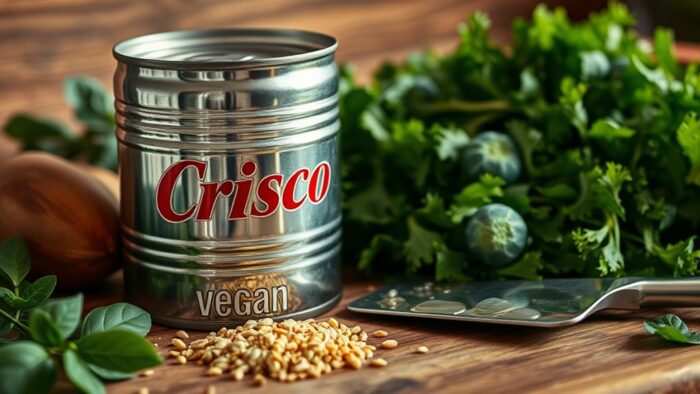Are Swedish Fish Vegan?
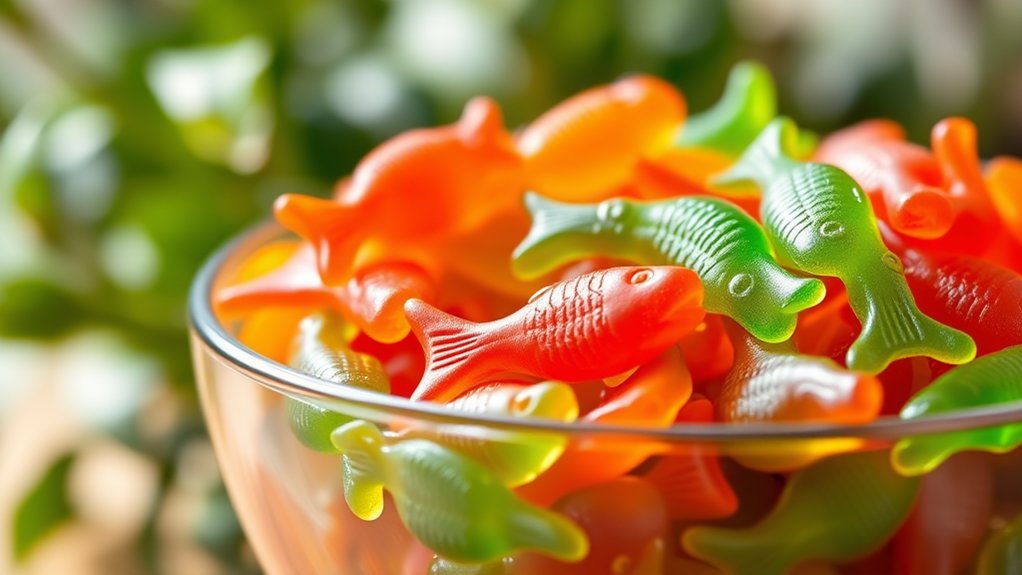
Are you curious about whether Swedish Fish are vegan? You’re not alone—many people wonder if their favorite candies fit into a plant-based lifestyle. While the chewy, fruity treats seem innocent enough, there are some hidden factors that could influence your decision. Sugar processing methods, the use of certain colorings, and even additional ingredients can complicate their vegan status. If you’re looking to satisfy your sweet tooth while staying true to your values, it’s important to dig a little deeper. Keep reading to uncover what you need to know about Swedish Fish and their ingredients!
What Are Swedish Fish?
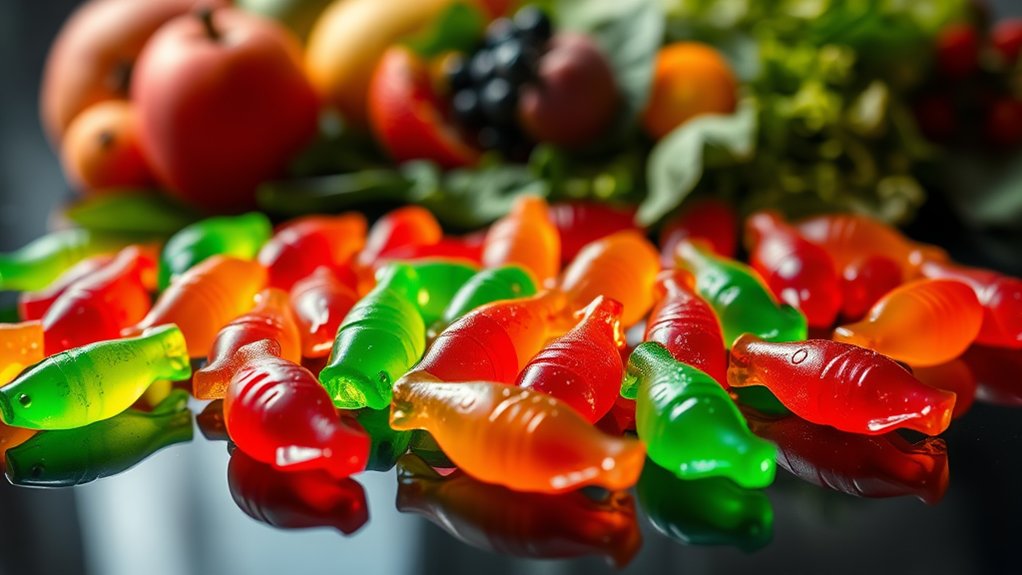
Swedish Fish are well-known, fish-shaped candies that have been enjoyed by many since they were first introduced in the late 1950s. Originally created by Malaco in Sweden, these candies were initially offered in a single red variety, featuring a distinct lingonberry flavor.
Over the years, Swedish Fish have expanded to include a range of colors and flavors, although it’s worth noting that the grape flavor was discontinued in 2006.
The main ingredients of Swedish Fish include sugar, corn syrup, modified corn starch, and flavorings. One of the notable aspects of Swedish Fish is that they don’t contain gelatin, which makes them a chewy option that’s generally suitable for vegans.
However, it’s important to be aware that some specific varieties may include ingredients like beeswax or sugar that has been processed with bone char, so checking the packaging is advisable if dietary restrictions are a concern.
In summary, Swedish Fish are primarily considered vegan-friendly and remain a popular treat for those seeking a chewy candy experience.
Whether you’re new to them or a long-time fan, understanding their ingredients and the range of flavors available can improve your enjoyment of this iconic candy.
Are All Swedish Fish Vegan-Friendly?
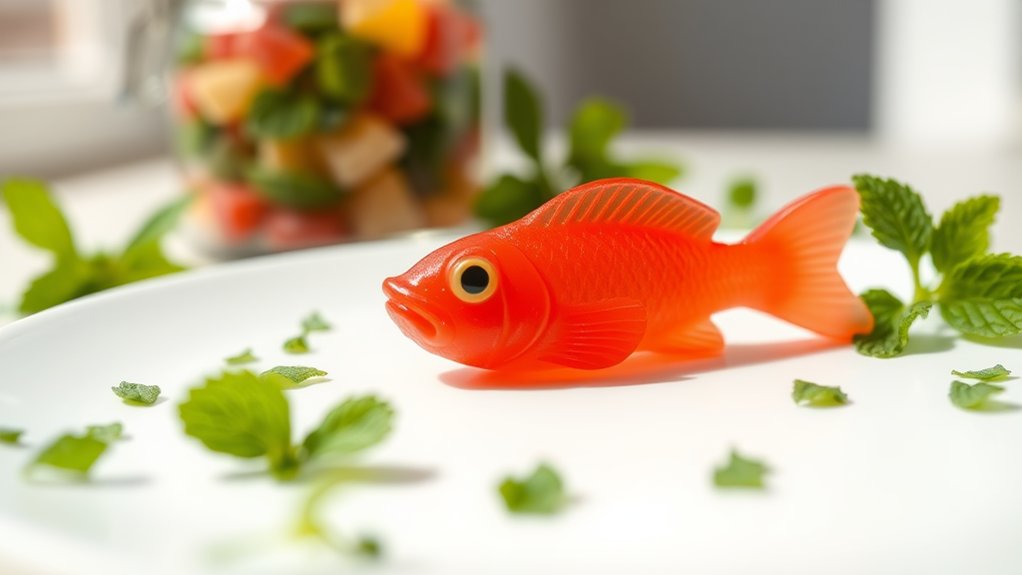
When considering whether Swedish Fish are vegan-friendly, it’s important to understand the nuances involved. While the classic Swedish Fish candies typically contain ingredients like sugar, corn syrup, and modified corn starch—ingredients that are generally regarded as vegan—there are exceptions to be aware of.
For instance, some variations, particularly those sold in peg bags, may include non-vegan ingredients such as beeswax.
Another point to consider is the sugar used in Swedish Fish. In some cases, sugar may be processed with bone char, which raises concerns for those adhering to a strict vegan lifestyle.
While Swedish Fish produced in the U.S. usually don’t contain animal products, ingredient sourcing can vary by manufacturer and location, leading to potential inconsistencies.
To confirm that the specific variety of Swedish Fish you choose aligns with your vegan dietary preferences, it’s crucial to read ingredient labels carefully. This practice will help you avoid accidentally consuming animal products.
Always verify the ingredients to make informed choices about your snacks.
Ingredient Variations in Swedish Fish
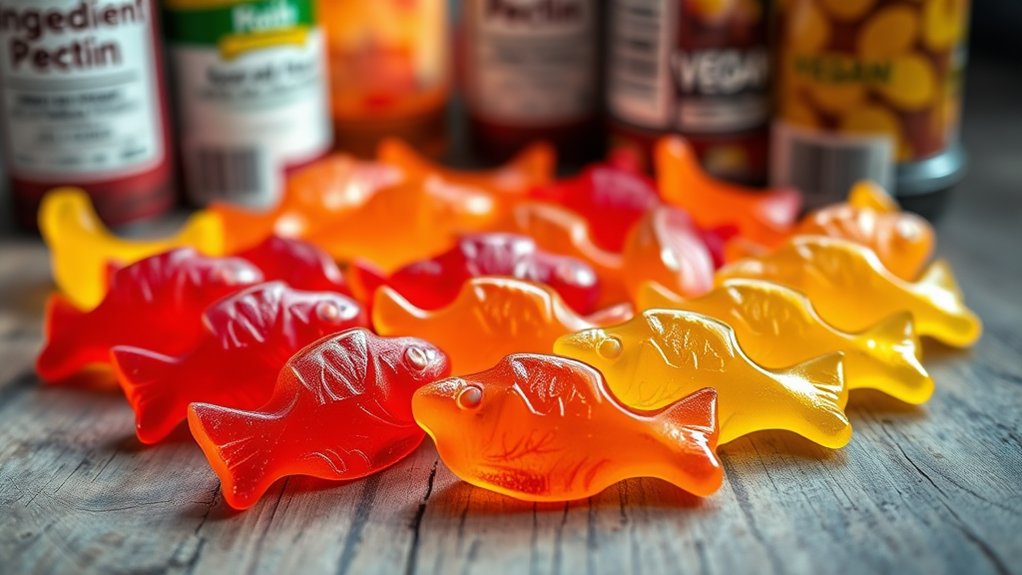
When examining the ingredient variations in Swedish Fish, it’s important to understand how different packaging can impact their vegan status.
Regular packaged Swedish Fish generally contain ingredients like sugar, invert sugar, corn syrup, modified corn starch, and citric acid, which are all considered vegan-friendly.
However, if you look at peg bag Swedish Fish, you’ll find some non-vegan ingredients, such as palm kernel oil and beeswax.
The inclusion of beeswax is particularly significant for those following a vegan lifestyle, as it’s a product derived from bees and raises ethical concerns regarding animal exploitation.
Therefore, it’s crucial to carefully read the ingredient list before purchasing Swedish Fish.
Depending on the type of packaging you choose, your selection may either align with or contradict your dietary values.
Being aware of these ingredient variations can help you make informed choices that suit your lifestyle.
The Controversy Around Sugar
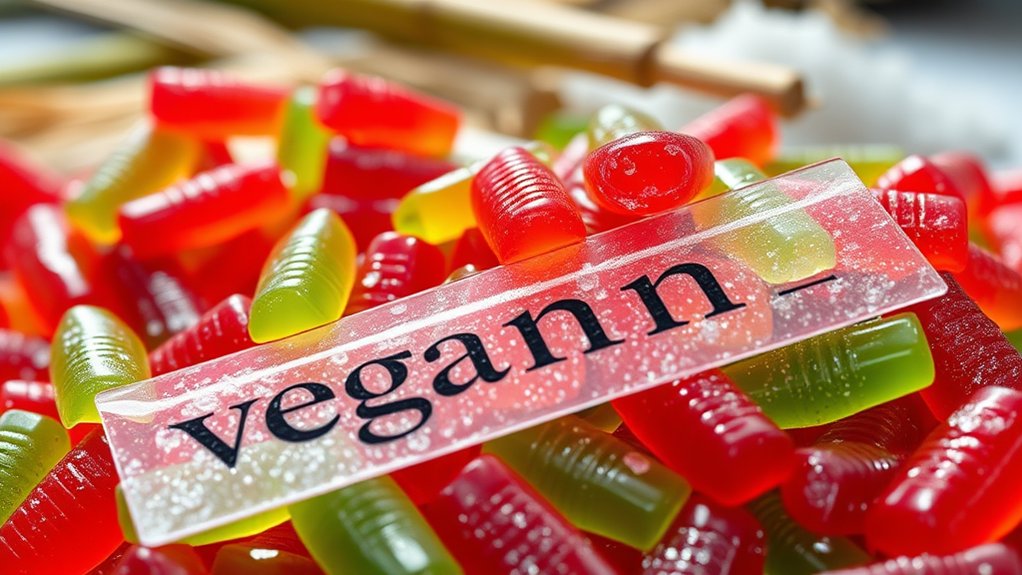
When thinking about the sugar in Swedish Fish, it’s important to look at how it’s processed. Many refined sugars can use bone char in their production, which can be a concern for those following a vegan lifestyle.
If you’re trying to steer clear of these types of sugars, alternatives like beet sugar or non-refined substitutes might be better options for you. Understanding where your sugar comes from can really help you make better choices about the snacks you enjoy.
Speaking of snacks, let’s dive into some healthier options that can satisfy your sweet tooth without the added concerns.
Sugar Processing Concerns
Many consumers may not be aware that the sugar used in popular candies, such as Swedish Fish, raises important ethical concerns related to its processing. One significant issue is that refined sugar is often processed using bone char, which comes from cattle. This practice can create challenges for those in the vegan community who wish to strictly adhere to plant-based principles.
To navigate these concerns, many vegans choose alternatives like beet sugar or sugar that’s certified organic. These options are typically processed without animal products, making them more aligned with vegan values. However, tracing the origin of sugar in commercial products can be quite complex. The lack of transparency in ingredient sourcing means that consumers may not always know what type of sugar is being used.
As a result, some individuals decide to avoid sweets that contain refined sugar altogether, opting for products made with alternative sweeteners or natural sugars instead. Being aware of how sugar is processed is crucial for anyone looking to make informed dietary choices, particularly within the vegan framework.
Understanding these sugar processing concerns not only helps in making ethical choices but also supports a broader awareness of food production practices. This knowledge empowers consumers to align their candy consumption with their personal values, assuring that they can enjoy their treats without compromising their beliefs.
Beet vs. Cane Sugar
When it comes to sugar, many people may not realize that there are significant differences between beet sugar and cane sugar, especially from a vegan perspective.
Beet sugar is often viewed as the more vegan-friendly option because its refining process doesn’t involve bone char, which is a method commonly used in the processing of cane sugar. This makes beet sugar a more straightforward choice for those adhering to a vegan lifestyle.
However, the processing of cane sugar can differ from one brand to another. Some brands may use bone char in their refining, while others do not. This inconsistency can make it challenging for consumers to determine whether a particular cane sugar product aligns with their ethical beliefs.
To mitigate this uncertainty, many vegans prefer to choose certified organic sugar. Organic certifications typically confirm that bone char isn’t used in processing, providing a safer choice for those concerned about animal-derived ingredients.
As you consider your sugar options, it’s vital to read labels carefully. Look for brands that clearly communicate their sourcing and processing methods. This transparency will help you make informed choices that are consistent with your values.
Alternatives to Refined Sugar
When analyzing alternatives to refined sugar, it’s essential to consider options that not only satisfy your sweet tooth but also align with your dietary preferences and ethical beliefs. Refined sugar often raises concerns among vegans due to its common processing method, which can involve bone char. This processing raises questions about its suitability for those following a vegan lifestyle.
Here are some viable alternatives to refined sugar:
- Beet Sugar: Unlike cane sugar, beet sugar is often not processed with bone char, making it a more suitable choice for vegans.
- Certified Organic Sugar: This type of sugar is guaranteed to be free from animal products, making certain that it aligns with vegan principles.
- Coconut Sugar: A natural sweetener derived from the sap of coconut blossoms, coconut sugar is an unrefined option that retains some nutrients.
- Maple Syrup: This natural sweetener comes from the sap of maple trees and is rich in antioxidants, making it a flavorful alternative.
- Agave Nectar: Sourced from the agave plant, this syrup is plant-based and has a lower glycemic index than traditional sugars, which may appeal to those monitoring their blood sugar levels.
Using these alternatives enables you to reduce refined sugar intake while addressing various dietary and ethical concerns.
Always check product labels to make certain they’re labeled vegan or certified organic, reinforcing your commitment to conscientious consumption.
The Use of Artificial Colors
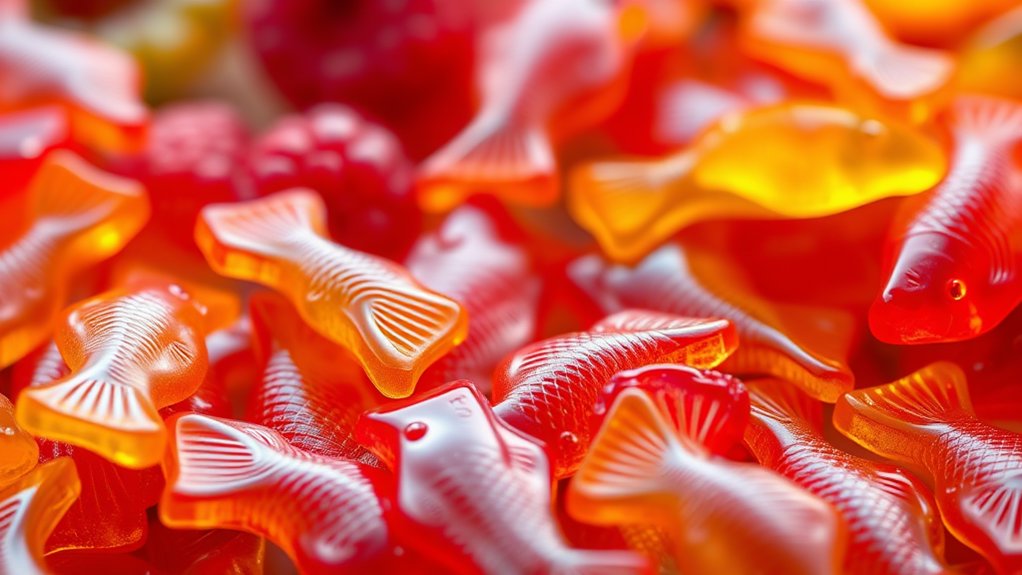
Swedish Fish contain artificial colors like Red 40 and Blue 1, which are synthetic and generally not sourced from animals, leading some to question their vegan status.
However, it’s important to note that these dyes might still undergo testing on animals, which raises ethical concerns for those who adhere to a strict vegan lifestyle.
As more consumers look for alternatives to artificial colors due to health and ethical reasons, the inclusion of these dyes in Swedish Fish makes their appeal a bit more complicated.
This shift in consumer preferences opens up a broader conversation about food labeling and the growing demand for transparency in ingredient sourcing.
Vegan Status of Dyes
When it comes to the vegan status of dyes, particularly artificial colors like Red 40, Yellow 6, Yellow 5, and Blue 1, it’s important to understand the nuances involved. While these dyes aren’t derived from animal sources, their production and testing processes can raise ethical concerns for many consumers, particularly those who identify as strict vegans.
Here are some key points to consider when evaluating the vegan status of dyes:
- Visual Appeal: Artificial colors are often used to increase the appearance of candies and other food products, making them more visually enticing to consumers.
- Vegan vs. Cruelty-Free: It’s essential to note that not all vegan products are cruelty-free. A product may not contain animal-derived ingredients but could still be tested on animals, which is a significant consideration for ethical consumers.
- Animal Testing Concerns: The issue of animal testing for dyes remains a contentious topic. Many vegans are concerned about the ethical implications of using products that have been tested on animals, regardless of the source of the ingredients.
- Cruelty-Free Certifications: To help navigate these concerns, certifications like Leaping Bunny can guide consumers toward brands that prioritize cruelty-free practices. These certifications indicate that the products haven’t been tested on animals at any stage of their production.
- Ingredient Sourcing and Testing Practices: Understanding how ingredients are sourced and the testing practices employed by brands can significantly influence purchasing decisions for vegans. Transparency in these areas is increasingly important for consumers who wish to align their purchases with their values.
By being aware of these factors, you can make informed choices about the products you buy, confirming they align with your ethical standards and dietary preferences.
Ultimately, the vegan status of dyes isn’t just about the ingredients themselves but also about the broader ethical implications surrounding their use.
Animal Testing Concerns
When considering artificial colors like Red 40 and Yellow 5, it’s important to understand their testing processes, particularly regarding animal welfare. While these colors themselves don’t contain animal-derived ingredients, they often undergo animal testing for safety assessments.
This can include tests for skin and eye irritation, as well as long-term feeding studies. Such practices raise ethical concerns, especially for those who prioritize cruelty-free and vegan principles, as they involve harm to animals for non-essential purposes.
If animal welfare is a priority for you, it’s crucial to be aware of these testing practices. One way to make certain that the products you choose align with your values is to look for candies certified by cruelty-free organizations, such as the Leaping Bunny program.
These certifications indicate that no animal testing was involved in the production of the product. Making informed choices is essential for anyone committed to a cruelty-free lifestyle.
Alternatives to Artificial Colors
As consumers become increasingly aware of ethical issues in food production, many companies are checking out alternatives to artificial colors in their products. While synthetic dyes such as Red 40 and Blue 1 may be considered vegan, they often raise concerns regarding animal testing. This has led to a growing interest in cruelty-free coloring options.
Natural alternatives to artificial colors not only align with ethical standards but also increase the appeal of products. Here are some effective natural coloring options to consider:
- Beet Juice: This vibrant red dye is derived from beets and is commonly used in various food products. It not only provides a striking color but also offers some nutritional benefits.
- Turmeric: Known for its warm yellow hue, turmeric is often used in both culinary and cosmetic applications. Beyond its coloring properties, it also has anti-inflammatory benefits.
- Spirulina: This blue-green algae can be used to achieve a green color in foods and beverages. Spirulina is packed with nutrients, making it a popular choice for health-conscious consumers.
- Carrot Juice: For a natural orange coloring, carrot juice is a great option. It adds a pleasant flavor as well as a vibrant hue, making it suitable for a variety of products.
- Purple Cabbage: Surprisingly, purple cabbage can produce a natural blue color when processed correctly. It’s a great example of how plant-based ingredients can be used creatively in food coloring.
By opting for these natural alternatives, companies can’t only address ethical concerns but also meet the growing demand for transparency and health-conscious products.
Switching to natural colors can increase brand loyalty and consumer trust, as shoppers increasingly seek out products that reflect their values.
Natural and Artificial Flavors Explained
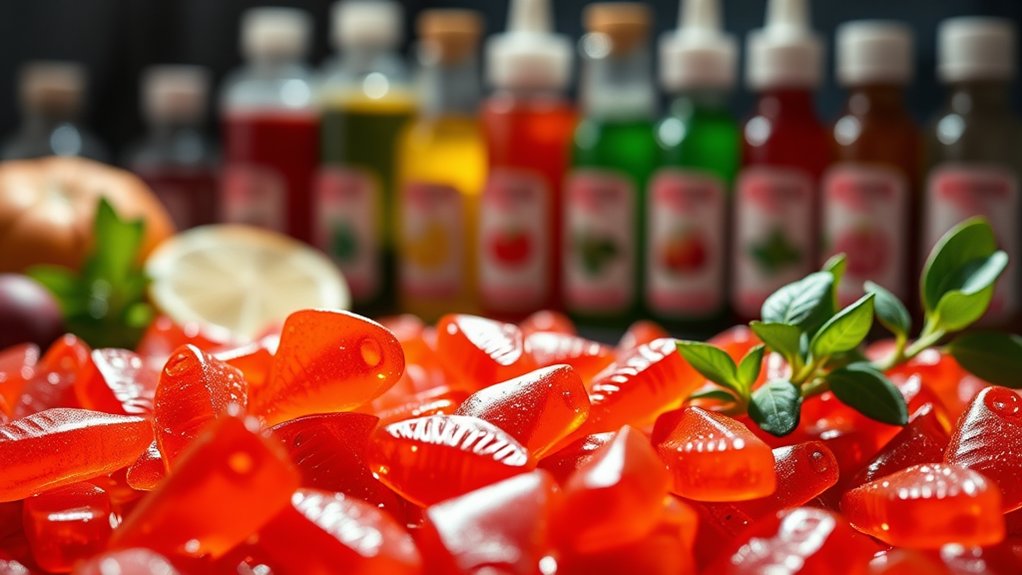
Have you ever wondered about the natural and artificial flavors in products like Swedish Fish? Understanding these flavors can help clarify their origins and implications for dietary choices.
Natural flavors can be derived from a variety of sources, including both plants and animals. In contrast, artificial flavors are typically synthesized and are generally considered vegan.
One of the challenges with natural flavors is that they aren’t always explicitly labeled, which can make it difficult to ascertain whether they contain animal-derived ingredients. This proprietary nature means that manufacturers often don’t disclose specific components, leading to some uncertainty for consumers, especially those following a vegan lifestyle.
If you’re concerned about whether natural or artificial flavors align with your dietary preferences, it can be helpful to contact manufacturers directly for more information.
While the inclusion of these flavors in products like Swedish Fish doesn’t inherently make them non-vegan, individual beliefs and dietary choices will ultimately influence how acceptable they’re to you.
The Issue of Beeswax in Some Varieties

When considering the ingredients in Swedish Fish, it’s important to pay attention to the fact that some varieties, particularly those packaged in peg bags, may contain beeswax.
This ingredient can be a concern for strict vegans, as beeswax is derived from bees and is therefore not suitable for those avoiding all animal products.
Beeswax is primarily used as a coating agent in certain types of Swedish Fish, which distinguishes these varieties from their vegan-friendly counterparts.
For strict vegans, it’s crucial to check the ingredient list for beeswax before making a purchase.
Typically, the regular packaged versions of Swedish Fish don’t include beeswax and are more likely to align with vegan dietary preferences.
To make informed choices, always review product labels carefully.
Tips for Vegan Consumers
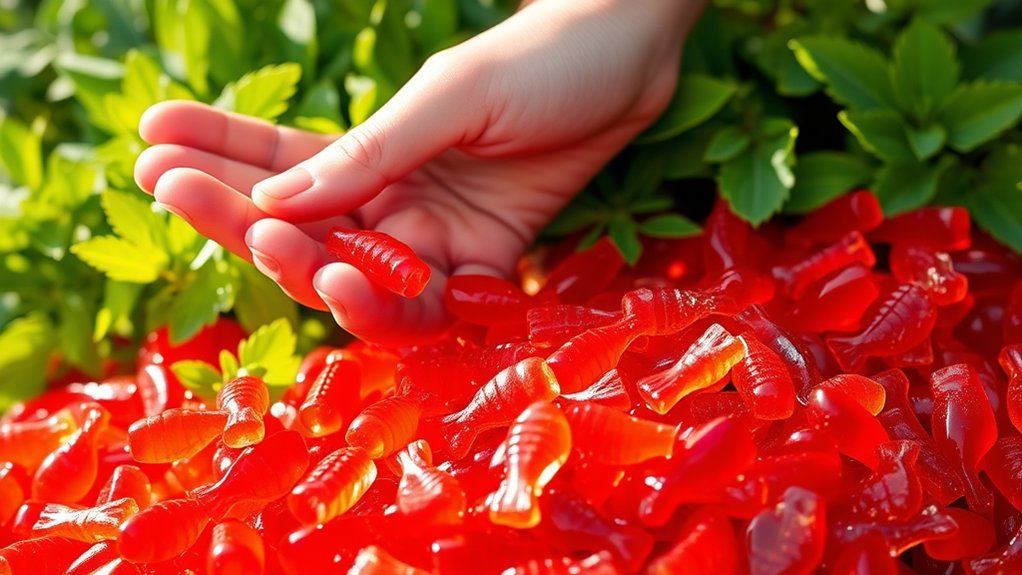
For vegan consumers, understanding the ingredient variations in Swedish Fish is essential. Most regular bags and boxes of Swedish Fish contain ingredients like sugar, corn syrup, and modified corn starch, which are generally considered vegan-friendly.
However, it’s important to always check the ingredient list, especially for varieties such as peg bags, which may include non-vegan components like beeswax.
Another consideration for strict vegans is that the sugar used in some Swedish Fish may be refined with bone char, a process that raises concerns for those adhering to a strict vegan lifestyle.
If animal testing is a concern for you, it’s wise to avoid products with artificial colors, even if they come from non-animal sources.
To confirm that you’re making choices that align with your vegan values, keep an eye on ingredient changes, particularly from brands like Mondelēz.
Staying informed about the ingredients in your favorite snacks will help you maintain your vegan lifestyle effectively.
Alternatives to Swedish Fish

If you’re looking for alternatives to Swedish Fish that fit within a vegan lifestyle, there are several options available that mimic the taste and texture without using any animal-derived ingredients. Here are some reliable vegan alternatives:
- Surf Sweets: These organic gummy candies are made with pectin instead of gelatin, making them a great choice for vegans. They come in various fruity flavors and are also free from allergens like gluten and dairy.
- YumEarth: This brand offers a range of vegan gummy candies, confirming they’re free from animal products. Their options are made with organic ingredients and come in a variety of flavors, making them a delicious treat.
- Haribo Vegan Bears: A more recent addition to the Haribo lineup, these gummy bears are specifically labeled as vegan-friendly and provide a familiar taste for fans of traditional gummy candies.
- Fruit Chews: These fruity, chewy snacks are often made from simple, plant-based ingredients and can be a satisfying alternative to Swedish Fish.
- Homemade Gummies: For those who enjoy a bit of kitchen creativity, homemade gummies can be a fun and customizable option. By using fruit juice, agar-agar (a gelatin substitute derived from seaweed), and your choice of sweeteners, you can create gummy candies tailored to your taste preferences.
These alternatives not only satisfy your sweet tooth but also allow you to maintain your vegan principles.





